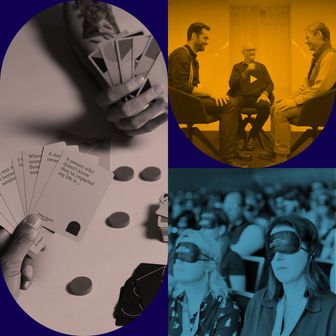
If you’re just tuning into Where Should We Begin? — speaking of which, have we mentioned the podcast has joined the Vox Media Podcast Network and the extended New York/the Cut universe and the latest season premieres today? Listen and follow for free on Apple Podcasts or wherever you listen — it might not be obvious where to start. Esther Perel’s flagship podcast, which follows anonymous couples through a single joint- therapy session, isn’t serialized, so each session is essentially a bottle episode, containing its own plot, characters, and themes. (Although many of these themes — intimacy, communication styles, past trauma — appear again and again.)
So to get you started, we’ve revisited the Where Should We Begin? back catalogue — the episodes, below, are all available online right now in addition to other audio projects — and organized the whole thing according to whatever relationship issue might pique your interest. Whether you want to listen to stories of infidelity, big fights, or couples wondering if all the work is worth it, here’s where to jump in.
Skip ahead to:
➼ The Couples With Fundamental Differences
➼ The Couples Who Can’t Stop Fighting
➼ The Couples Whose Families Are Part of the Problem
➼ The Couples With Complicated Sex Lives
➼ The Couples Who Include Other People
➼ And Finally, the Couples Struggling With the Big One: Infidelity
➼ Still overwhelmed? Fine. Just tell us your sign.
The Couples With Fundamental Differences
When culture or identity clashes lead to rifts, Perel tends to remind couples that their relationship should be a place of safety. “Don’t give the best of yourself to strangers and leave the rest at home,” she says in the episode “On Again/Off Again.” In other words: The way to work through fundamental differences is to create a home between one another.
The issue: Worrying about whether a partner is really The One
The episode: “On Again/Off Again”
The couple in this episode has been together, on and off, for 20 years. They face a host of doubts: He isn’t able to envision a long-term plan in his life, and she isn’t confident in his love for her. Plus, both of them come with long-standing ideas about what it means to be Black and married in modern society.
The issue: Entrenched codependency
The episode: “In This Relationship What Is ‘I’ and What Is ‘Me’”
In this episode, Perel talks to a couple in which both parties grew up in the Dominican Republic and experienced parent-related trauma as children — which bonded them and propelled their joint immigration to the U.S. As adults living in New York, one of them wants a little more freedom from the relationship, and it’s bringing up old issues.
The issue: Navigating a caretaker complex
The episode: “I Can Be Strong and Be Taken Care Of”
In all relationships, a pendulum swings back and forth between who needs to be cared for, when, and how much. If one person continually defaults into caretaker mode, that equilibrium gets lost. Perel talks to this couple about fears of abandonment and inadequacy.
The issue: When one partner isn’t out yet
The episode: “What Would It Take for You to Come Out?”
This couple’s circumstances are specific — two women who have been together for three years, but one of them hasn’t told her family about their relationship — but the episode digs into bigger questions around how people from deeply entrenched, very different cultural backgrounds can come together.
The Couples Who Can’t Stop Fighting
With couples who fight (and fight and fight), Perel reminds each individual that their reactions are fully their responsibility, not their partner’s. Everyone needs to take a step back and recognize their own role in their significant other’s outbursts.
The issue: Totally different fighting styles
The episode: “It’s Very Hard to Live With a Saint”
This newly married couple see themselves as competing figures: He’s the calm, saintlike one; she’s the explosive, reactive one. Each one, in a way, is reenacting old habits and survival methods from their childhood.
The issue: Fighting dirty
The episode: “I Don’t Mean to Be Mean, But…”
Much like the couple in “It’s Very Hard to Live With a Saint,” this couple has completely different communication styles that launch them into a frequent pattern of fighting and instability. Adding to the turmoil, one of them has a habit of airing her marriage grievances with her family, causing her partner to shut down and retreat even further.
The issue: Having the same argument over and over again
The episode: “Trapped in Their Own Story”
Most couples fight, but some get stuck in a loop of fighting — the kind where you can anticipate, word for word, what your partner will say. This couple is one of those. They keep arguing about infidelity but can’t get closer to seeing each other’s perspectives.
The issue: Wondering if the fighting is even worth it
The episode: “Twice Married, to Each Other”
Is the struggle worth it? That question arises for most couples at one point or another, but will feel more urgent for some people at certain crossroads. This episode’s couple has been married, divorced, and married again — but they still fight about everything, despite having doubled down on their relationship. Perel talks to them about what the conflict is for, and whether the marriage is worth the work.
The Couples Whose Families Are Part of the Problem
When Perel meets with couples whose struggles involve other family members (in-laws, kids, past partners), her message is about finding ways to support one another — through hugs, touches, and other reassurances — in order to build a strong foundation and tackle issues as a united front.
The issue: Clashes between partner and family
The episode: “He Loves Her, His Family Rejects Her”
In-laws are a perennial punch line (or headache, depending on your point of view), but the couple in this episode has a more-dramatic-than-usual backstory: She left her husband in Brazil to be with him in the U.S., but his family isn’t welcoming her — even though she came here alone and doesn’t have anyone else.
The issue: Worrying the relationship is affecting the kids
The episode: “Burdens of the Family”
People talk often these days about “inherited trauma,” and this episode looks at it through the lens of two people who grew up as refugees, have kids together, and are afraid they’ll pass on their own traumatic pasts.
The issue: Raising a blended family
The episode: “We Started As an Affair”
Relationships that grow out of affairs are never just about the two partners — they also include the people affected by the affair. Perel talks to a couple who reconnected after 20 years and are very much in love, but have ex-partners and teenage kids from past marriages to consider as well.
The Couples With Complicated Sex Lives
Intimacy has long been Perel’s bread and butter (the TED Talk that put her on the map is about desire), and her perspective on the topic has remained the same: Sex is less about what’s going on in the bedroom and more about what’s going on in your mind.
The issue: Being stuck in a sexual standstill
The episode: “Speak to Me in French”
This husband and wife grew up Evangelical, and their marriage was never built on a sexual connection. They never managed to find one, either, so Perel tries to get them to see each other differently — by asking them to speak in a different language.
The issue: Inherited sexual baggage
The episode: “My Orgasm Is Not Just for Me”
People seek sex outside of their relationship for a long list of reasons. In this episode, a woman whose family and cultural history has her feeling disconnected from her body — and from her partner, at least in the bedroom — wants to heal by way of nonmonogamous encounters.
The Couples Who Include Other People
Perel has always said that monogamy is not a prerequisite for a happy coupling. So for partners who are looking to open their relationship, she pushes each individual to consider their own personal boundaries before diving in. “Both partners need to be able to carry both sides,” she says.
If you’re negotiating the boundaries of polyamory…
… listen to “You Want Me to Watch the Kids While You Go Out With Another Guy?”
Shifting from a monogamous relationship into a polyamorous one is, for most people, a serious undertaking: There’s an infinite combination of expectations, guidelines, and boundaries to talk about. Not surprisingly, these new arrangements often require constant renegotiation, which is what Perel discusses with the couple in this episode.
The issue: Changing gender identity and boundaries within the relationship
The episode: “Before We Got Together, I Identified As Gay”
A straight man and a gay man start dating, embark on a nonmonogamous arrangement, and one of them begins to newly identify as nonbinary. This episode goes beyond making sense of polyamory — and all of the layered emotions, needs, and fears it can stir up — and gets into broader ideas around allowing one person to change while in a serious relationship.
And Finally, Couples Struggling With the Big One: Infidelity
Many consider infidelity to be the death knell of a relationship, but Perel has always taken a more open-minded approach. “Love is messy; infidelity more so. But it is also a window, like none other, into the crevices of the human heart,” she writes in her book The State of Affairs.
The issue: Rebuilding trust
The episode: “I’ve Had 100 Conversations With You in My Head”
This episode features a woman who discovered her partner cheated on her after a routine trip to the doctor, at which she was diagnosed with an STD. She’s lost trust in her partner; he desperately wants to get it back. Perel points out that you cannot build trust without a few missteps — even when it feels like the past is too big to move beyond.
The issue: When the cheating is just one of your problems
The episode: “When I’m Manic I Cheat”
Perel’s clients in this episode are dealing with a matrix of overlapping, cause-and-effect issues: bipolar disorder, open relationships, infidelity, and a friend group that thinks one party should bail.
The issue: Cheating again and again
The episode: “The Chronic Philanderer”
Infidelity means something different in every relationship. For some, it’s the end of the partnership; for others, that’s not the case. Unlike the couple in “I’ve Had 100 Conversations With You in My Head,” the person who cheated here has been doing so for years and fails to fully grasp how much it hurts his partner. Perel’s advice is to examine the question of why they’ve found themselves in that repeating dynamic.
Still overwhelmed? Fine. Just tell us your sign.
We spoke to astrologer Aliza Kelly about each star sign’s major relationship issues in order to pair them with the perfect episode.
If you’re an Aries, listen to “It’s Very Hard to Live With a Saint”
According to Kelly, Aries are known to be impulsive, reactive, and prone to explosive arguments, making it extra-important for them to learn how to fight fair. “It’s Very Hard to Live With a Saint” includes some basic guidance for explosive types.
If you’re a Taurus, listen to “Burdens of the Family”
This earth sign is loyal, steady, and — according to Kelly — completely stubborn. They need help accepting change, which is why “Burdens of the Family,” in which Perel works with a couple on letting go of their past trauma, is a good listen.
If you’re a Gemini, listen to “Twice Married, to Each Other”
Curious and playful, Geminis are also prone to major commitment issues, preferring to jump from one new beginning to the next. In this episode, a divorced and then remarried couple talks to Perel about their ongoing tumult with one another.
If you’re a Cancer, listen to “I Don’t Mean to Be Mean, But …”
Cancers seek love and nurturing but tend to be indirect in expressing their feelings. “I Don’t Mean to Be Mean, But…” features a couple trying to overcome completely different communication styles.
If you’re a Leo, listen to “You Want Me to Watch the Kids While You Go Out With Another Guy?”
Kelly says Leos want to be the star of the show. But in relationships, there are two (if not more) people and sets of desires. Most of Perel’s episodes deal with compromise and supporting your partner, but this episode — which, on its face, is about figuring out polyamory — would be a good place to start.
If you’re a Virgo, listen to “My Orgasm Is Not Just for Me”
Analytical and pragmatic, Virgos have a tendency to get in their own head. It’s important to learn not to catastrophize. “My Orgasm Is Not Just for Me” features a couple trying to parse a complicated solution for rekindling a physical connection.
If you’re a Libra, listen to “On Again/Off Again”
Kelly says that Libras have a tendency to shine their light on anyone around them — sometimes leaving their partner in the shadows. “On Again/Off Again” features a woman who is desperate for a little reassurance from her partner.
If you’re a Scorpio, listen to “In This Relationship What Is ‘I’ and What Is ‘Me’”
Scorpios crave intense, powerful connections. In the long term, that can weigh heavily on their partner. This episode is about a couple with a tight-knit bond, created by parallel past trauma, trying to establish new, sometimes separate social lives.
If you’re a Sagittarius, listen to “Speak to Me in French”
According to Kelly, Sagittarians are philosophical and adventurous but have a tendency to bolt when things don’t work. “Speak to Me in French” is about a couple ready to split up; Perel helps them find a new, inventive way to communicate.
If you’re a Capricorn, listen to “The Chronic Philanderer”
Capricorns have a tendency to come off as cold and clinical with their significant others, treating them less like lovers or partners and more like assistants, as Kelly says. Of course, not all Capricorns are chronic philanderers, but this episode highlights what happens when one person doesn’t think of the other person’s feelings before acting.
If you’re an Aquarius, listen to “Trapped in Their Own Story”
Kelly says Aquarians are innovative types who think in big-picture terms. They can also be a little judgmental. “Trapped in Their Own Story” deals with a couple where both halves of a partnership are unable to see the other’s side. Perel helps them to work through their own biases and meet in the middle.
If you’re a Pisces, listen to “I Can Be Strong and Be Taken Care Of”
There’s being caring, and then there’s being a martyr, and Kelly says Pisces have a habit of falling into the latter category. The main theme of “I Can Be Strong and Be Taken Care Of” has to do with separating a caretaker complex from showing care and giving love.
More From Esther Perel's Universe
- Esther Perel’s Advice for Giving Advice (and Hosting Dinner Parties)
- The Complete Esther Perel Immersion Course
- Esther Perel’s Favorite Episodes of Her Own Podcast












